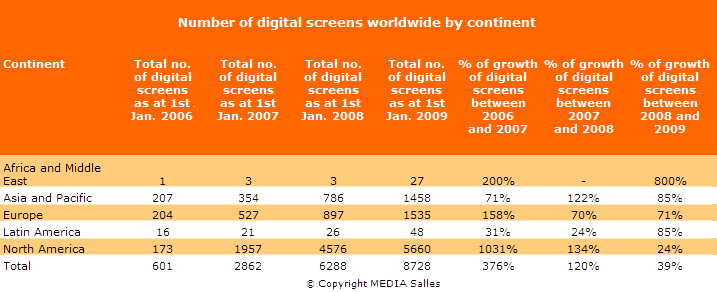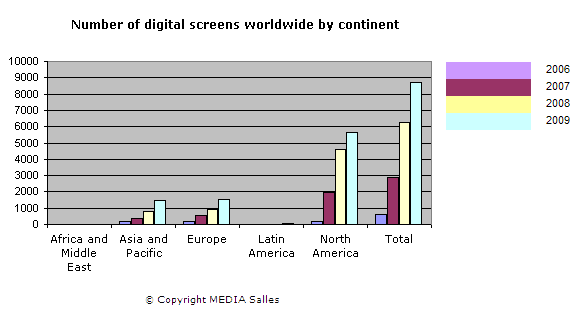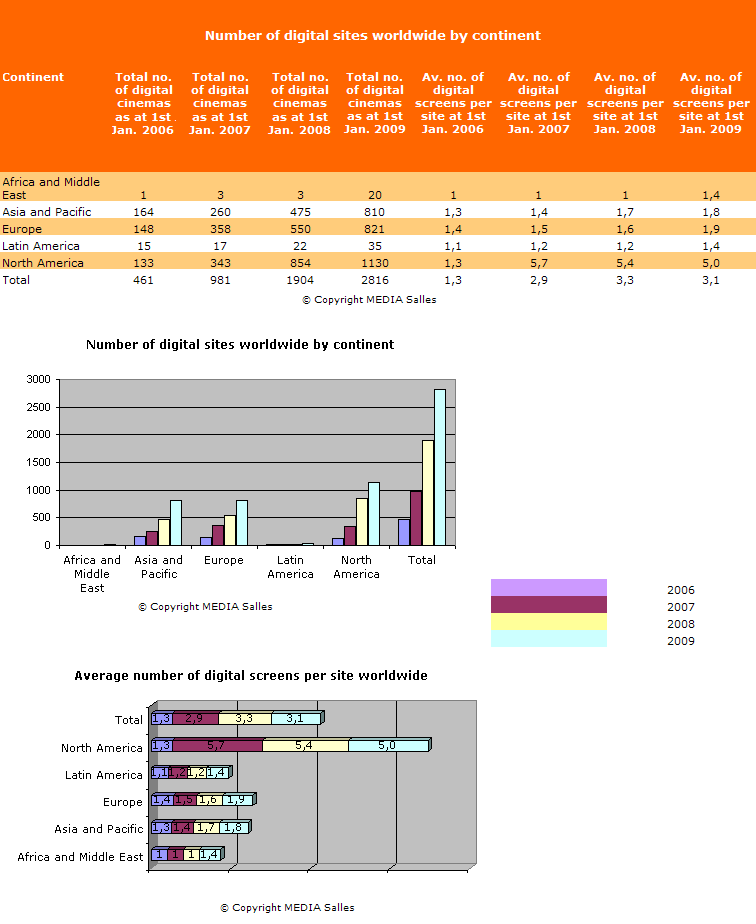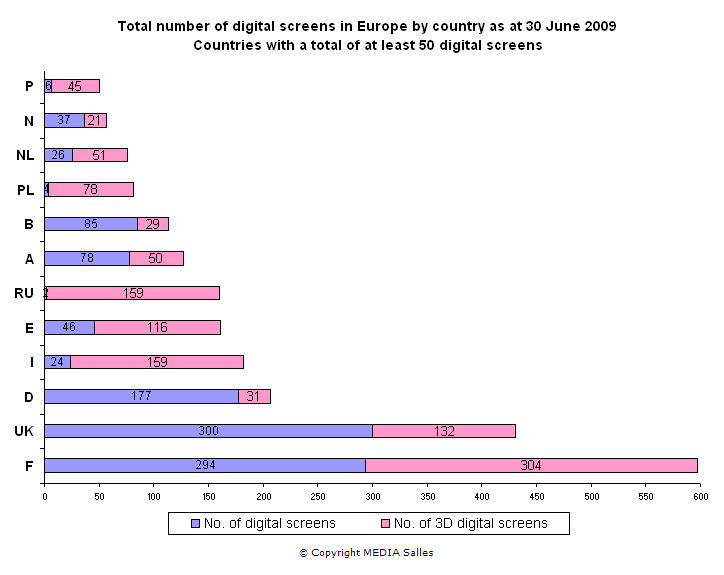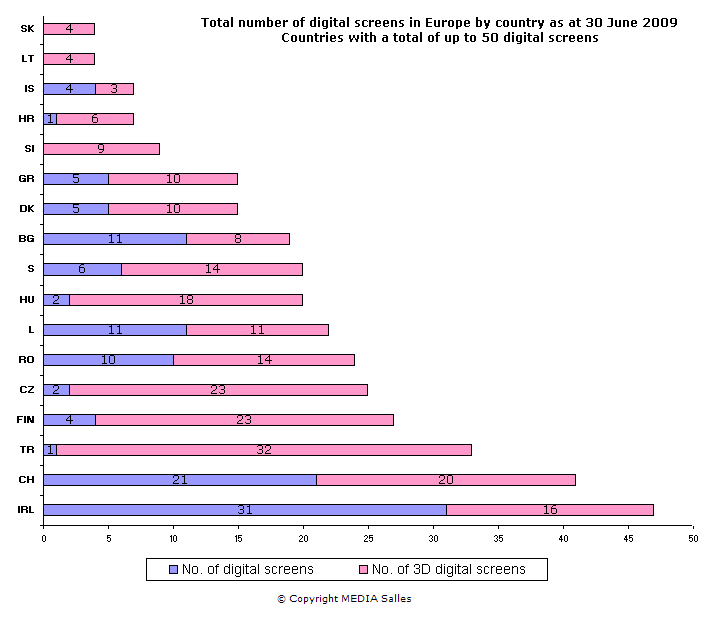
Reg. Trib. Milano n. 418 del 02.07.2007
Direttore responsabile: Elisabetta Brunella
![]()
![]()
International Edition No. 53 - year 5 - 11 February 2010

***
Dear readers,
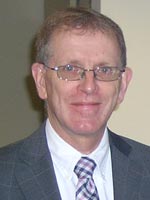 it
is time to turn that important diary note into a firm booking: “DigiTraining
Plus 2010” in Helsinki from February 17 to 21 is rapidly approaching,
and it will be my pleasure to welcome you to the land of the Northern
Lights on behalf of our President Jens Rykaer and the MEDIA Salles Executive
Committee.
it
is time to turn that important diary note into a firm booking: “DigiTraining
Plus 2010” in Helsinki from February 17 to 21 is rapidly approaching,
and it will be my pleasure to welcome you to the land of the Northern
Lights on behalf of our President Jens Rykaer and the MEDIA Salles Executive
Committee.
We have joined forces with The Finnish Film Foundation and The Finnish Chamber of Films to construct a course exploring the programming issues for a digitally equipped cinema and the extra uses for this equipment open to exhibitors.
Does this equipment make down time in cinemas into a profitable time? What is “alternative content” and where does it come from? How is it received? What is an “integrator” and what can it do for me?
We have all seen the huge figures for Avatar 3D worldwide: is it a one-way trip to Pandora or is it the start of a new fantastic journey for us all?
All these questions and many more will be answered in Helsinki: thick coats, boots, woolly hats and gloves essential…that sounds like the UK in the past few weeks, but we only experience that weather every 25 years or so!
Mike Vickers
Treasurer of MEDIA Salles
(Per leggere il testo in italiano cliccare qui)
To the participants at the “DigiTraining
Plus: European Cinemas Experiencing New Technologies” 2010 course
Dear friends,
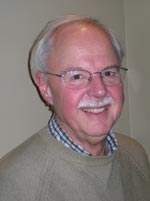 digital
cinema is a topic which has been discussed by cinemas for over 10 years
but there are still no simple answers to the many questions that arise.
Some cinemas have installed digital projectors and recent 3D films demonstrated
one reason for doing so. The technology has proved itself but justifying
the substantial financial investment needed remains a challenge, especially
for small cinemas. The programme for this year's “DigiTraining
Plus” course in Helsinki covers all the current issues and promises
to be of great value to the very wide range of participants who will
be there.
digital
cinema is a topic which has been discussed by cinemas for over 10 years
but there are still no simple answers to the many questions that arise.
Some cinemas have installed digital projectors and recent 3D films demonstrated
one reason for doing so. The technology has proved itself but justifying
the substantial financial investment needed remains a challenge, especially
for small cinemas. The programme for this year's “DigiTraining
Plus” course in Helsinki covers all the current issues and promises
to be of great value to the very wide range of participants who will
be there.
I was very pleased to be asked to be the Moderator for the course and
will be doing my best to ensure everyone attending benefits from it.
I greatly look forward to meeting you all.
Anthony Williams
Course Moderator
(Per leggere
il testo in italiano cliccare qui)
Message from Kerstin Degerman, Head of the MEDIA Desk Finland
 We
are happy to welcome participants from all sectors to the “DigiTraining
Plus” course in Helsinki in February 2010, both cinema owners
and distributors and other professionals. During the days they spend
in Helsinki the participants will have the possibility to get to know
both the digital transition in general and its development in the region:
there are presentations on both Finland and the Nordic countries, and
Russia as well.
We
are happy to welcome participants from all sectors to the “DigiTraining
Plus” course in Helsinki in February 2010, both cinema owners
and distributors and other professionals. During the days they spend
in Helsinki the participants will have the possibility to get to know
both the digital transition in general and its development in the region:
there are presentations on both Finland and the Nordic countries, and
Russia as well.
The first “DigiTraining Plus” course ever
in Finland also offers a Studia Generalia on Thursday 18 February, in
the morning, open to Finnish professionals and thus offering a possibility
for the participants to meet the field more broadly. The American-based
digital cinema expert Michael Karagosian will be talking about the structure
and the contents of the digital cinema chain. Mr Karagosian has a vast
experience in the cinema industry, and he will lecture on both the present
situation and on future prospects for digital cinema in the world.
Finns are known to be very enthusiastic about new technologies and,
accordingly, many Finnish screens are digital already; for the moment
there are 48 digital screens in Finland, and it is predicted that 25%
of the screens will be digital by the end of 2010, thanks to help from
domestic public support. The Finnish digital experts will generously
share their knowledge on how the transition in Finland was carried out:
among others Harri Ahokas, Head of Domestic Distribution at the Finnish
Film Foundation, Tero Koistinen, CEO of the Finnish Chamber of Films,
and Ari Saarinen, Technical Supervisor and Manager at Finnkino.
Dear participants, Helsinki is – at least for the moment – in the most beautiful winter shape ever; so there will be lots for you to explore also outside the theatres, and don’t forget to bring warm clothes and cameras!
See you soon
(Per leggere
il testo in italiano cliccare qui)
WOMEN IN DIGITAL CINEMA
Riitta Haapiainen
SES Auditorium Ltd
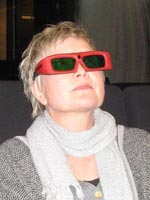 The
Finnish Film Foundation is an independent foundation which is supervised
by the Department for Cultural Policy in the Ministry of Education.
The
Finnish Film Foundation is an independent foundation which is supervised
by the Department for Cultural Policy in the Ministry of Education.
The Foundation´s task is to support and develop Finnish film production,
distribution and exhibition. The Finnish Film Foundation owns SES Auditorium
Kino K-13, the cinema which is located at the Foundation´s headquarters
in Katajanokka, in Helsinki.
Kino K-13 serves the Finnish film producers, distributors and post production
companies as a test cinema. We have many opening evenings, especially
of short and documentary films and television productions. We hold screenings
of children´s films and film cultural events. Our cinema can also
be rented and used as a meeting and congress facility.
Kino K-13 was renovated in 2008. It was given a real face lift: we changed
the 1980 pink style to dramatic black and grey. Our new look was designed
by architect Heikki Lamusuo and artist Jaana Partanen.
The same year, 2008, we also installed the digital projector into our
booth, the 16mm film projector had to go. However, the 35mm projector
Cinemeccanica, Victoria 5, is still beside the new digital one, although
in our cinema the digital equipment is already working more hours than
the film projector.
The digital projector we have is a Barco 1500 and the server store and
player are Dolby`s DSS 100 and DSP 100. Just one week ago we got our
XpanD 3D system.
Something about myself: I have been working in the cinema
industry for a long time. I started my film work in the film lab, in
the evenings I was selling tickets, coffee and candies in the cinema.
I left the laboratory and found myself in the projection room, where
I was very happy. I had, for example, the possibility to show 70mm film,
and I felt like being on the top of my career … actually I still
feel the same: that was the most challenging moment. This change to
a digital system brings a whole different challenge: you don’t
need muscles for lifting the hard disks but knowing the data technology
helps a lot. I took part in the “DigiTraining Plus” course
in 2007 and it was very important to gain knowledge from the experts
and meet colleagues who already had some experience of the new technology.
Here in the Finnish Film Foundation I started working in 2001, I am
also the Managing Director of the Cinema, but deep in my heart I am
a projectionist and very proud of my profession.
I myself and the Finnish Film Foundation warmly welcome “DigiTraining Plus 2010” course participants to our beautiful Helsinki.
|
|
|
|
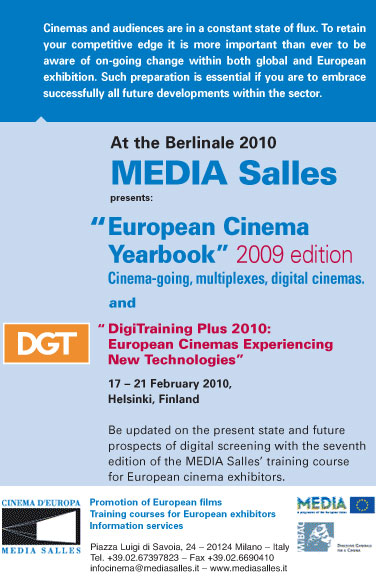
|
By Tobias Jacobsen, participant at the ”DigiTraining Plus 2009”
 Knowledge.
A fundamental condition for making the right decisions must be based
on an updated and solid knowledge of the subject. To achieve an overview
of the consequences of the digitalisation of cinemas is a huge challenge.
The business is a complex and ramified organism with many areas of interest
and corresponding partners each with their own agenda. As digitalisation
is an international change in a standard dating back more than 100 years
the change of medium is a manoeuvre that calls for a certain respect
and cautiousness. Much money is to be earned and also to be lost if
you do not make the right decisions based on knowledge.
Knowledge.
A fundamental condition for making the right decisions must be based
on an updated and solid knowledge of the subject. To achieve an overview
of the consequences of the digitalisation of cinemas is a huge challenge.
The business is a complex and ramified organism with many areas of interest
and corresponding partners each with their own agenda. As digitalisation
is an international change in a standard dating back more than 100 years
the change of medium is a manoeuvre that calls for a certain respect
and cautiousness. Much money is to be earned and also to be lost if
you do not make the right decisions based on knowledge.
Without any solid knowledge of digital cinema and as a first-time participant on a course on this very subject, the following is my experience of the situation in general within the EU as it was reflected at the “DigiTraining Plus 2009” course in London.
To distinguish between 3D-technology and digitalisation as such is a necessity in order to introduce light and shade into the challenges facing the move to another medium. At present it is the 3D-locomotive that drives digitalisation and the chains which have a commercial interest seem to succeed in achieving this. But 3D alone is not enough to stimulate a change of medium for those cinemas that do not have a specific priority in positioning themselves in the marketplace or have an audience segment that fits into exactly this context. For them conventional 2D and its content is central. And even if many promises are made by those who hail 3D as the format of the future for any film, it is doubtful that this will happen in the near future – if ever. There are obvious possibilities but also limits in telling stories in 3D and only the future will show if 3D is as revolutionary as some predict.
Probably 3D will merely be an add-on and not the nucleus in a business model that will have to finance the heavy cost of digital equipment in the cinema. Certainly insecurity still remains as to realistic depreciation models which are central in order to relate to the eventual assets or disadvantages of the investment. Digital technologies become obsolete very fast in all other areas worldwide and there is no reason to believe that it should be any different in our business. Of course it is of prime importance whether today’s standards (DCI, SMPTE, NATO etc.) that have almost fallen into place after long and troubled negotiations will be changed. It is probably doubtful that anybody feels like shaking the foundation of today’s definition of digital cinema.
| DigiTraining
Plus 2010: European Cinemas Experiencing New Technologies 17 – 21 February 2010, Helsinki Course programme |
||||
| Wednesday, 17 February | Thursday, 18 February | Friday, 19 February | Saturday, 20 February | Sunday, 21 February |
|
|
Breakfast at the Hotel |
Breakfast at the Hotel |
Breakfast at the Hotel |
Breakfast at the Hotel |
| Individual arrivals to Helsinki
(before check-in time the hotel will keep the participants’ luggage in its luggage room) |
8.45 am Open door session, in collaboration with the MEDIA Desk Finland: 9.00 am 9.10 am 9.40 am 10.00 am 10.20 am 11.35 am 12.00 pm 12.30 pm
Lunch for the course participants at the Finnish Film Foundation |
8.30 am Significant experiences from Finland 9.10 am Visit to Bio Grand, Tikkurila – Presentation by Kimmo Lohman, Cinema Manager 10.15 am Coffee break 11.00 am “D-cinema: what cinema owners don’t know or normally forget to think about”: presentation by Ari Saarinen, Technical supervisor and Manager, Finnkino 12.15 pm Participants are free for lunch at the Flamingo Shopping Center 1.30 pm |
8.30 am Significant experiences from Finland 9.15 am 10.00 am 10.45 am 11.00 am 11.30 am 12.00 pm
|
8.45 am 11.15 am 12.00 pm
|
| AFTERNOON |
AFTERNOON |
AFTERNOON |
AFTERNOON |
AFTERNOON |
Check in at the Best Western Premier Hotel Katajanokka and registration at the course 3.30 pm Coffe and tea Welcome speeches by the organisers and partners 4.00 pm 4.15 pm 4.30 pm - Tero Koistinen, CEO, Finnish Chamber of Films 5.00 pm 5.30 pm 6.45 pm |
2.00 pm 2.45 pm Q&A session 3.10 pm Harri Ahokas, Head of Domestic Distribution, Finnish Film Foundation - Ramon Reissmüller, Digitalt Projekt, Swedish Film Institute (Sweden) - Rolv Gjestland, Adviser in cinema technology and design, Film & Kino (Norway) - Jan Petersen, IT manager of Nordisk Film Biografer (Denmark) 4.20 pm 4.40 pm 5.45 pm 6.30 pm 6.45 pm |
At the Finnish Film Foundation Auditorium 2.30 pm Erik Hamre, Emerging Pictures, Denmark Fabrice Testa, Vice President Sales & Business Development XDC 3.30 pm 3.45 pm 4.00 pm Fabrice Testa, Vice President Sales & Business Development XDC Screening of a selection of excerpts of European digital movies, with the collaboration of XDC 4.30 pm 4.45 pm 5.30 pm 6.30 pm |
At the Finnish Film Foundation Auditorium 2.00 pm 2.20 pm 2.30 pm 3.45 pm 4.00 pm 4.30 pm 4.40 pm Final statements
|
|
8.30 pm |
Participants are free for Helsinki
sightseeing and dinner |
Participants are free for Helsinki
sightseeing and dinner |
Closing dinner |
|
| All different, all
digital This column hosts portraits of cinemas in Europe and the rest of the world which are quite different from one another but have in common the fact that they have all adopted digital projection.
* Source: MEDIA Salles, as at 1st January 2009
|
||||||||||||||||||||||||||||||||||||||||||||||
The MEDIA Salles statistics on digitalisation worldwide
|
| News on the development
of digitalisation in the world Arts Alliance Media reaches agreement with Denmark Digital on the digitalization of 60 screens The integrator Arts Alliance Media has just announced that a 6.7 million euro agreement has been reached with Denmark Digital, a group of 31 independent cinemas, on the digitalization of around 60 Danish screens. Thanks to existing agreements with 5 Hollywood majors, Arts Alliance Media and Denmark Digital will attempt to involve Danish distributors in the agreement also. Together the two parties will choose the equipment – all 3D-compatible – and the rollout will begin shortly, partly in order to benefit from up and coming 3D releases, including How to Train Your Dragon and Shrek Forever After. The agreement also foresees the possibility for all 31 cinemas to install equipment for the broadcasting of alternative content via satellite, thanks to Arqiva, partner of Arts Alliance Media. |
| A new project
networking 100 digital cinemas presented at SAT Expo Europe The “Progetto
100 sale in rete” (“100 Cinemas Networking Project”),
promoted in Italy by the General Direction for the Cinema at the
Ministry of Cultural Affairs, with the collaboration of Eutelsat,
was presented in Rome on 4 February at SAT Expo Europe. The objective
of the initiative is to establish a wide-ranging chain of digital
cinemas using satellite projection for screening not only cinema
content but also events. |
MEDIA Salles’ contacts and address
MEDIA Salles
Piazza Luigi di Savoia, 24 – 20124 Milano - Italy
Tel.: +39.02.6739781 – Fax: +39.02.6690410
E-mail: infocinema@mediasalles.it
Sito web: www.mediasalles.it


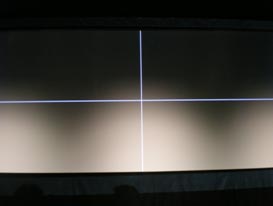
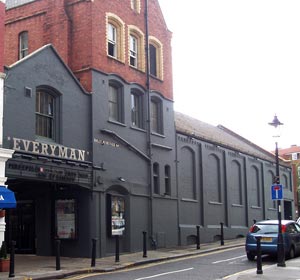 Great
Britain – they say – is the homeland of US-imported
multiplexes: another 216 complexes with at least 8 screens have
arrived, following the ground-breaking Milton Keynes in 1984,
for a total of 2,382* screens – that is, around 66% of the
country’s total screens, the highest density in Europe.
Great
Britain – they say – is the homeland of US-imported
multiplexes: another 216 complexes with at least 8 screens have
arrived, following the ground-breaking Milton Keynes in 1984,
for a total of 2,382* screens – that is, around 66% of the
country’s total screens, the highest density in Europe.